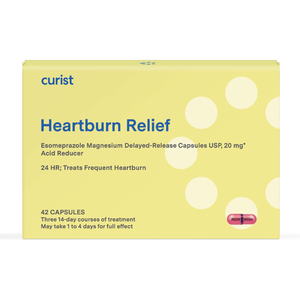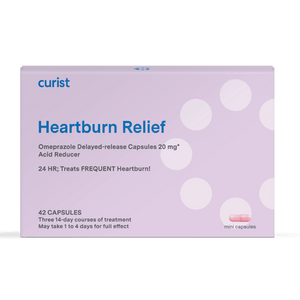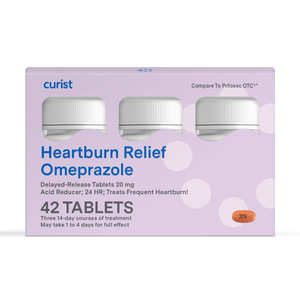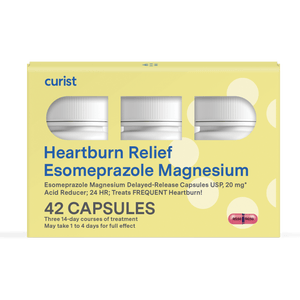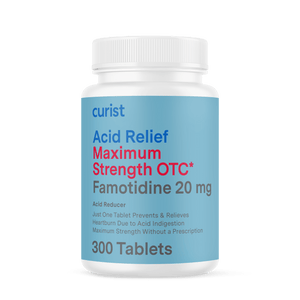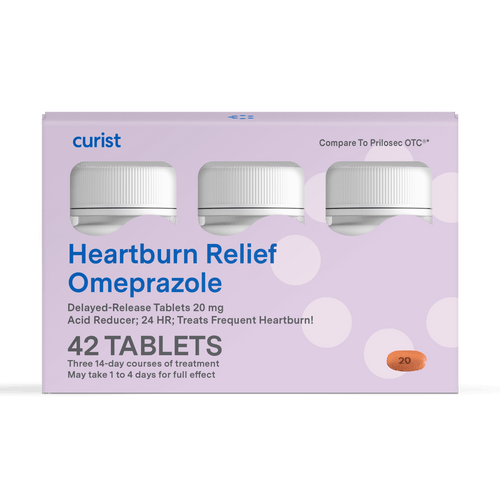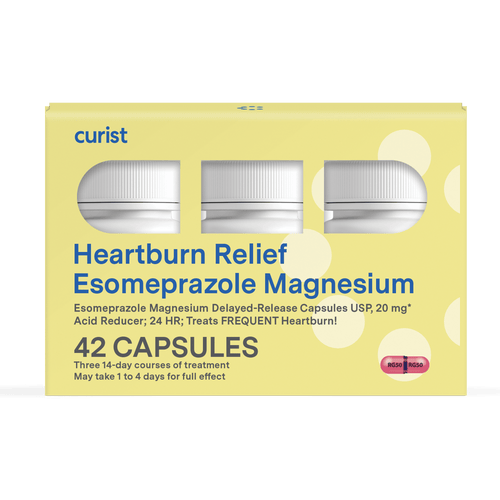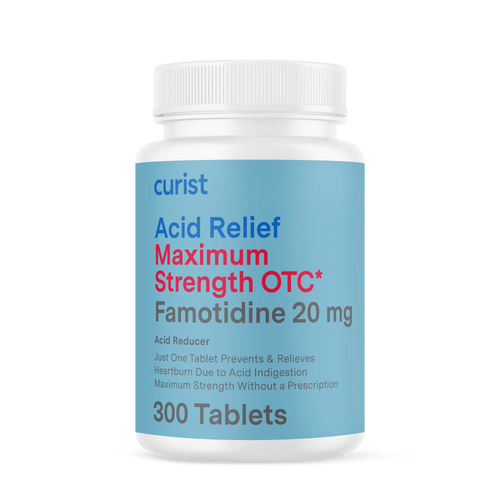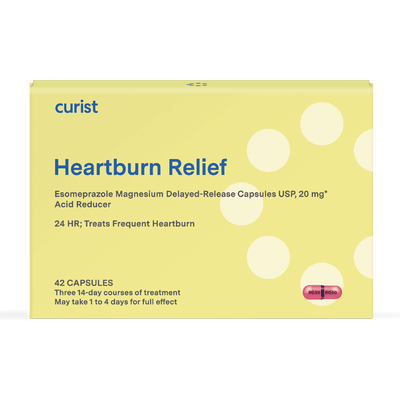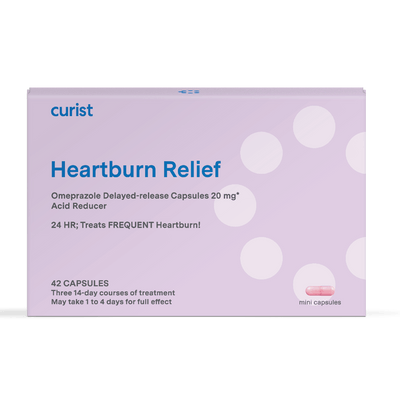By Deni Hui, The University of Texas at Austin College of Pharmacy
Curist delivers over-the-counter medicines to your door at a fraction of the price of traditional brands. We hope everyone stays safe and healthy during this time.
You may have seen both omeprazole (Prilosec) and esomeprazole (Nexium) in the heartburn relief aisle of your local pharmacy. Have you ever debated which one to purchase? Have you ever wondered what the differences are between the two?
PPIs: What are Omeprazole and Esomeprazole?
Omeprazole and Esomeprazole are both proton-pump inhibitors (PPIs). This class of over-the-counter medications is used to treat frequent heartburn that occurs 2 or more days per week. They work by decreasing the amount of acid that the stomach produces and are more effective in providing long-lasting heartburn relief than H2 blockers or antacids.
How are Omeprazole and Esomeprazole Similar?
Omeprazole and esomeprazole are both proton-pump inhibitors, and share several similar characteristics:
- Omeprazole and esomeprazole are both used to treat heartburn and excess release of stomach acid.
- Omeprazole and esomeprazole have similar prices.
- Omeprazole and esomeprazole both can be taken in combination with a quick-acting antacid (eg. Maalox® or Tums®) to provide quick relief.
- Omeprazole and esomeprazole both can take some time (ranging from several days to weeks) to reach full effects and thus they are most beneficial in treating frequent episodes of heartburns.
- Omeprazole and esomeprazole both last longer than other classes of acid reducer and thus only need to be taken once daily for 14 days. If you feel the need to use them for more than 14 days, make sure to consult with your doctor first since long-term use can put you at risk for many health issues such as osteoporosis, low magnesium or vitamin B12 levels, and rebound acid secretion (where your body starts to create more acid than before after stopping these medications).
What are the Key Differences Between Omeprazole vs Esomeprazole?
Scientifically, omeprazole is a mixture of two stereo-isomers: R-omeprazole and S-omeprazole, while esomeprazole contains only one isomer, S-omeprazole. Stereo-isomers are compounds that have the same chemical formula but differ only in their arrangement of atoms, hence the similarity in their names.
There is some evidence that esomeprazole provides more effective acid control, lasts longer and works faster than omeprazole however, several studies have failed to find a difference between the two medications. The American College of Gastroenterology states that there are no major differences between the two when it comes to treatment of heartburn.
While both esomeprazole and omeprazole generally offer the same level of benefits, it may just come down to personal preference and cost. If you take other medications or have any medical conditions, it is a good idea to talk to your doctor or pharmacist for advice on the best and safest choice for you.
Esomeprazole vs Omeprazole for Reflux Esophagitis (GERD)
Reflux esophagitis is caused by stomach acid entering into your esophagus. When this occurs 2 or more days per week, clinically it is referred to as gastroesophageal reflux disease (GERD). Esomeprazole and omeprazole are available both as an over-the-counter drug and as a prescription (used under the care of a doctor). When taken as an OTC, each is used to treat frequent heartburn. Under the supervision of a doctor, omeprazole and esomeprazole can each be used to treat GERD. In addition to treating similar conditions, omeprazole and esomeprazole have similar chemical structures. There is evidence that esomeprazole may be more effective at controlling acid, but other studies have not found a significant difference between omeprazole versus esomeprazole. As a result, taking omeprazole or esomeprazole for GERD often comes down to personal choice. Please discuss with your healthcare provider for more details and about potential side effects for using these medicines to treat GERD.
Omeprazole vs Esomeprazole Dosage
Both omeprazole and esomeprazole are best taken for frequent episodes of heartburn. They can both be purchased over-the-counter (OTC) in the form of 20 mg strength delayed-release capsules (at Curist here). To get the most benefits from these PPIs, it is best to take them once daily for 14 days. If you feel the need to use them for more than 14 days, make sure to consult with your doctor first.
Is Esomeprazole Better Than Omeprazole?
One study shows that patients treated with esomeprazole experienced faster symptom relief than those treated with omeprazole and other PPIs. However scientists and clinicians generally agree that both omeprazole and esomeprazole have the same effects overall, and that one is not superior to another.
Whether it is esomeprazole or omeprazole, the best medication is the one that works best for you (with the least amount of side effects). If you are unsure, consult your healthcare provider first who can help select the best drug for you based on your symptoms, medical condition(s), and other medicines you take that could interact with either omeprazole or esomeprazole.
Can I Take Esomeprazole Instead of Omeprazole?
Yes. While both esomeprazole and omeprazole generally offer the same level of heartburn relief, it may just come down to personal preference (eg. tolerance of side effects) and cost to which product you choose to pick. However, it is important to keep in mind that both esomeprazole and omeprazole may interact with other medications. Therefore, if you take other medications or have any medical conditions, it is a good idea to talk to your doctor or pharmacist for advice on the best and safest choice for you.
Can I Switch From Esomeprazole to Omeprazole?
Yes, both omeprazole and esomeprazole offer similar symptom relief from heartburn. However, if your heartburn symptoms continue to persist or if you are experiencing any allergic reactions or problems with the medication, it is important to notify your doctor or pharmacist right away. In this circumstance, it is not recommended to switch medication yourself without prior consultation.
What is the Difference between Omeprazole vs Prilosec?
Omeprazole is the name of the medicine in Prilosec. In order to take omeprazole, you can take Prilosec or a product like Curist (available here at about half the price of Prilosec). Both Prilosec and Curist Omeprazole have the same strength of omeprazole (20 mg), so the symptom relief will be the same. To learn more about omeprazole, check out Curist’s Omeprazole FAQ.
What is the Difference Between Omeprazole OTC vs RX?
Another important distinction is between prescription (RX) omeprazole and over-the-counter (OTC) omeprazole. The RX version of omeprazole requires a doctor to write a prescription, whereas the OTC version does not (at Curist, omeprazole OTC can be purchased online without a doctor’s visit). Both prescription omeprazole and omeprazole OTC contain the same active ingredient, omeprazole, which effectively reduces stomach acid production. Prescription omeprazole is used in conjunction with a doctor, and therefore can be used to treat diseases (e.g. residual symptoms of GERD, H.Pylori eradication, dyspepsia, Zollinger-Ellison syndrome, etc.) that require a diagnosis and supervision by your doctor, while omeprazole OTC treats frequent episodes of heartburn symptoms without doctor supervision.
What is the Difference Between Esomeprazole vs Nexium?
Esomeprazole is the name of the medicine in Nexium. To take esomeprazole, you can buy Nexium or a product like Curist (available here at about half the price of Nexium). Both Nexium and Curist Esomeprazole have the same strength of esomeprazole (20 mg), so the relief for heartburn and acid reflux is the same. To learn more about esomeprazole, check out Curist’s Esomeprazole FAQ.
What is the Difference Between Esomeprazole OTC vs RX?
An important difference is between prescription (RX) esomeprazole and over-the-counter (OTC) esomeprazole. The prescription esomeprazole requires a diagnosis and prescription script from a doctor in order to take, whereas the over-the-counter version does not require a doctor’s prescription (at Curist, esomeprazole OTC can be purchased online and shipped to you without a doctor’s visit). Esomeprazole RX and esomeprazole OTC both contain the same medicine, esomeprazole, which treats heartburn symptoms by reducing the production of stomach acid. Prescription esomeprazole is used under the supervision of a doctor, and therefore can be used to treat diseases (e.g. ulcer, residual symptoms of GERD, H.Pylori eradication, dyspepsia, etc.) that require a diagnosis and supervision by your doctor, while esomeprazole OTC only treats frequent episodes of heartburn symptoms.
If you want to learn more about heartburn and various relief options, check out Curist’s other articles about heartburn:
- Nexium vs. Prilosec: Which Heartburn Medicine is Better?
- Food & Diet Tips to Reduce Heartburn
- Tips to Prevent Acid Reflux & Heartburn
- Omeprazole FAQ
- Esomeprazole FAQ
Where Can I Buy Esomeprazole and Omeprazole Online?
The over-the-counter versions of esomeprazole and omeprazole are available in local pharmacies as well as stores online like Curist, and do not need a prescription.
At Curist, we develop FDA-approved equivalents to big brands in order to provide the same medicine relief but at half the price of the brands. Curist products are sold online and shipped directly to your door. To learn more:


